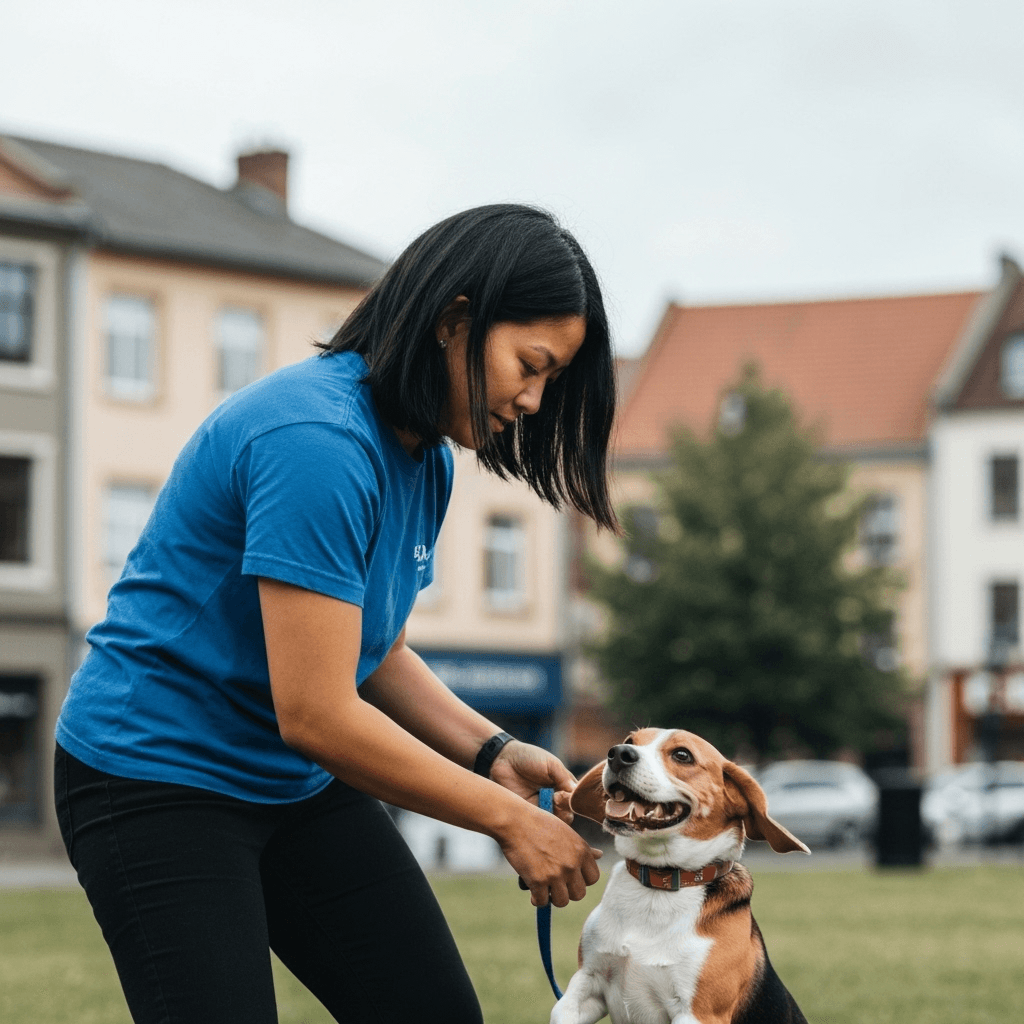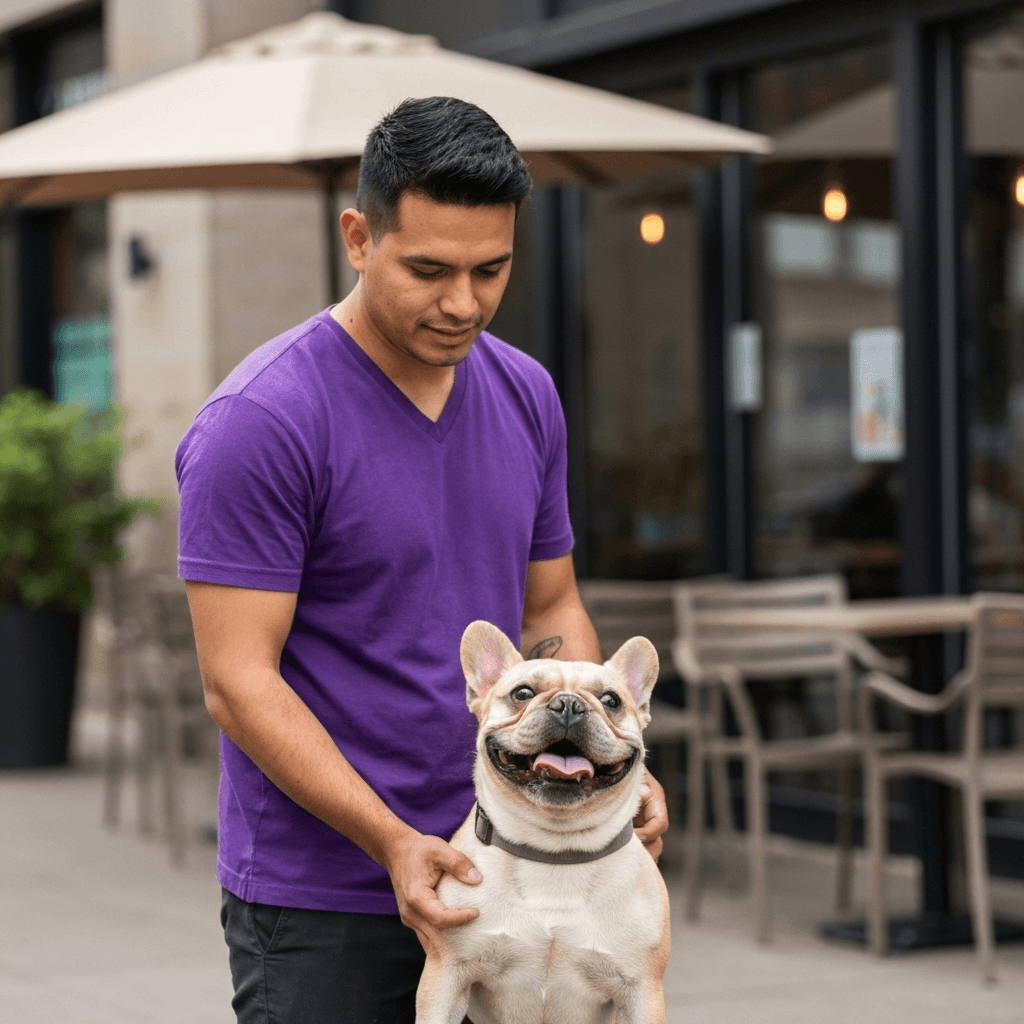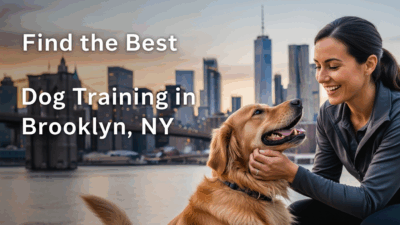Your Complete Guide to Choosing a Dog Trainer in Brooklyn
Living with a dog in Brooklyn brings unique challenges. Your pup needs to handle crowded sidewalks, subway sounds, and busy parks without getting overwhelmed or reactive.
The right trainer will help your dog master essential skills like walking calmly past street vendors, settling under café tables in Williamsburg, and navigating the weekend crowds at Prospect Park. They’ll also understand local rules and neighborhood quirks that make Brooklyn dog ownership easier.
Finding the Right Trainer for Your Dog
Start by looking for trainers who use positive reinforcement methods. These approaches build confidence and create reliable behaviors even when your dog encounters typical Brooklyn distractions like delivery trucks, street musicians, or crowded stoops.
Good credentials tell you a trainer has invested in proper education. Look for certifications like KPA-CTP, CPDT-KA, or IAABC-CDBC for behavior issues. If your dog shows aggression or severe reactivity, ask about specialized certifications like CBCC-KA or science-based programs like CTC.
In-home training works well for apartment-specific issues like door manners, elevator behavior, or practicing leash skills on your actual walking route. Group classes become valuable once your dog can focus around other dogs and people without becoming too excited or stressed.
Day training offers a good solution when your schedule is packed, but make sure the trainer includes coaching sessions so you can maintain the progress at home. If you plan to meet in local parks, confirm your trainer knows NYC’s off-leash rules and peak busy times.
Training Methods That Work in the City

Reward-based training reduces stress and builds the kind of calm, reliable behavior you need in crowded neighborhoods. These methods also help you stay within NYC rules that require dogs to remain under control in public spaces.
Puppy programs should cover socialization to city sights and sounds, potty training for apartment living, and gentle leash training so your young dog learns to navigate stoops, car traffic, and subway entrances without fear. Early training prevents many problems before they start.
Basic obedience builds essential skills like sit, down, stay, recall, and loose-leash walking. These behaviors make daily activities like stopping at bodegas, sitting on café patios, and walking through park paths much more enjoyable for both of you.
Behavior modification addresses serious issues like reactivity toward other dogs, separation anxiety, resource guarding, or fearfulness. This specialized work uses careful desensitization and counterconditioning with clear safety plans tailored to your dog’s specific triggers.
Private lessons let trainers customize approaches to your building’s layout, your roommates’ schedules, and your dog’s particular challenges. Group classes add controlled distractions that prepare you for real-world scenarios in busy areas like Downtown Brooklyn.
Board and train programs can help with intensive behavior work, but verify that methods stay humane, updates come frequently, and transfer sessions happen in your actual home environment. Service dog training or therapy dog preparation requires structured public-access skills and a long-term training program with specific goals.
What You Can Expect to Pay
Training costs in Brooklyn vary based on the trainer’s credentials, session length, behavior complexity, and travel requirements. Here’s what local dog owners typically pay in 2025.
| Service Type | Average Cost (Brooklyn/Kings County) |
|---|---|
| Puppy classes (4–6 weeks) | $220–$450 total |
| Group classes (4–6 weeks) | $240–$480 total |
| Private lessons (60–90 min) | $140–$250 per session |
| In-home coaching packages (4–6 visits) | $600–$1,200 total |
| Day training (trainer works your dog + handoff) | $650–$1,400 per week |
| Initial behavior consult (reactivity/anxiety) | $200–$350 |
| Board and train (2–4 weeks) | $2,400–$5,500 total |
Rates run higher for severe behavior cases or sessions during peak demand times. Some trainers offer brief phone consultations or limited free consultations, but always confirm exactly what’s included before booking.
Important Questions to Ask
When interviewing potential trainers, these questions will help you find the right fit:
- What training methods do you use, and how do you keep sessions positive and low-stress?
- What credentials do you hold, such as CPDT-KA or KPA-CTP? Do you maintain hands-on certifications like CPDT-KSA?
- How will you adapt training to Brooklyn’s unique environment with parks, subways, and busy streets?
- Do you offer in-home coaching, group classes, or day training, and which approach fits my goals?
- How will we measure progress and know when to add more challenging distractions?
- What are your total costs, travel fees, and cancellation policies?
- Do you carry business liability insurance, and can you provide proof?
- For behavioral issues, will you work with my veterinarian if needed?
Local Rules You Should Know
Dogs must be licensed in NYC. You can get your license or learn about requirements through NYC dog licensing.
NYC requires leashes in public spaces, with a maximum length of 6 feet. Many parks allow off-leash time during set hours (usually 9 p.m. to 9 a.m.) in designated areas, but always check posted signs at each specific park.
You must pick up and dispose of dog waste everywhere. NYC’s “pooper scooper” rules get enforced regularly, especially on sidewalks and near schools.
New York State requires current rabies vaccination for all dogs. For complete statewide requirements, check New York State rabies information.
Excessive barking falls under NYC’s noise regulations and can lead to complaints from neighbors. Trainers can teach quiet cues, provide enrichment ideas, and help you create better daily routines.
If a trainer offers overnight boarding or runs a training facility, NYC Department of Health permits may apply. Always ask for proof of permits and insurance for any board and train services. Commercial use of parks for classes might require permits and insurance, so verify park rules before scheduling group sessions.
Helpful Brooklyn Resources
Several local parks offer good training environments when used respectfully:
Hillside Dog Park in Brooklyn Heights provides a large, shaded, fully fenced area that’s perfect for practicing recall during quieter hours. McCarren Park Dog Run in Williamsburg/Greenpoint has separate sections for small and large dogs, making it useful for controlled socialization work.
Maria Hernandez Park Dog Run in Bushwick lets you practice obedience training around typical city distractions like skateboards and music. You can find complete park rules and dog-run details at Dogs in NYC Parks.
For daily success, keep a standard 6-foot leash handy, carry high-value treats for unexpected training opportunities, and practice “leave it” near food vendors and sidewalk debris. These small preparations make every walk a chance to reinforce good behavior.

Common Questions
How much does in-home dog training cost?
Most Brooklyn trainers charge $140–$250 per visit, with discounts available when you book multiple sessions upfront. Behavior modification work typically starts at the higher end of this range.
Is in-home dog training worth it?
Absolutely. Working in your actual environment lets you address real problems where they happen, like door greetings, elevator behavior, and leash reactivity on your regular walking routes.
Can you pay someone to house train your dog?
Many trainers offer comprehensive puppy programs that include potty training, crate routines, and scheduling guidance. Day training can accelerate house training while teaching you how to maintain the routine.
What is the 3-3-3 rule for dog training?
This guideline suggests dogs need about 3 days to decompress in a new situation, 3 weeks to learn new routines, and 3 months to feel fully settled. Training plans should account for this natural timeline.
How long will it take to reach my training goals?
Most dogs with basic behavioral issues show strong progress within 4–8 weeks when owners practice daily. Reactivity, aggression, or severe anxiety can require several months of structured behavior modification work.
What should I bring to group classes?
Pack a flat collar or harness, a 6-foot leash, high-value treats, water for your dog, and current vaccination records if the trainer requests them. Leave retractable leashes at home since they don’t provide good control.
What’s the leash law in Brooklyn?
NYC requires dogs to stay leashed in public areas, typically at 6 feet or shorter. Some parks allow off-leash time during posted hours in designated areas, but rules vary by location.
Do I need a dog license in Brooklyn or Kings County?
Yes, NYC requires current dog licenses for all dogs. You can apply or renew through NYC dog licensing.
What shots does my dog need in Kings County or New York State?
Rabies vaccination is mandatory statewide, and local veterinarians provide this service. Check state rabies guidance for complete requirements.
Are dog trainers required to be licensed in Brooklyn or Kings County or New York State?
No special state license exists for dog trainers. However, businesses that board dogs or operate training facilities may need NYC and state permits plus insurance coverage.
Where can I practice off-leash recall?
Use fenced dog runs like Hillside Dog Park or McCarren Park Dog Run during quieter periods. Always follow posted rules and be considerate of other park users.
Which dog parks allow training around Brooklyn?
Hillside Dog Park, McCarren Park Dog Run, and Maria Hernandez Park Dog Run generally welcome training inside the fenced areas as long as you don’t disrupt other dogs and owners. Keep sessions brief and respectful.
What beaches or trails allow dogs for training?
Most NYC park paths and lawns welcome leashed dogs where signs don’t prohibit them. For off-leash areas, follow each park’s specific posted hours and avoid sensitive wildlife zones.
Can I train in NYC parks as a business?
Professional training activities may require permits and insurance coverage. Make sure your trainer confirms park permissions before scheduling group classes in public spaces.
Do trainers need insurance in Brooklyn?
While no specific law requires insurance for independent trainers, most professionals carry general liability coverage and provide proof when requested. Many training venues require insurance before allowing classes.
Finding a professional dog trainer who understands Brooklyn’s pace and challenges makes daily life with your dog much smoother. Look for someone who uses positive methods, holds relevant credentials like IAABC-CDBC, and offers clear training sessions designed to help your dog become a confident, well-behaved neighbor in this amazing but demanding city.
